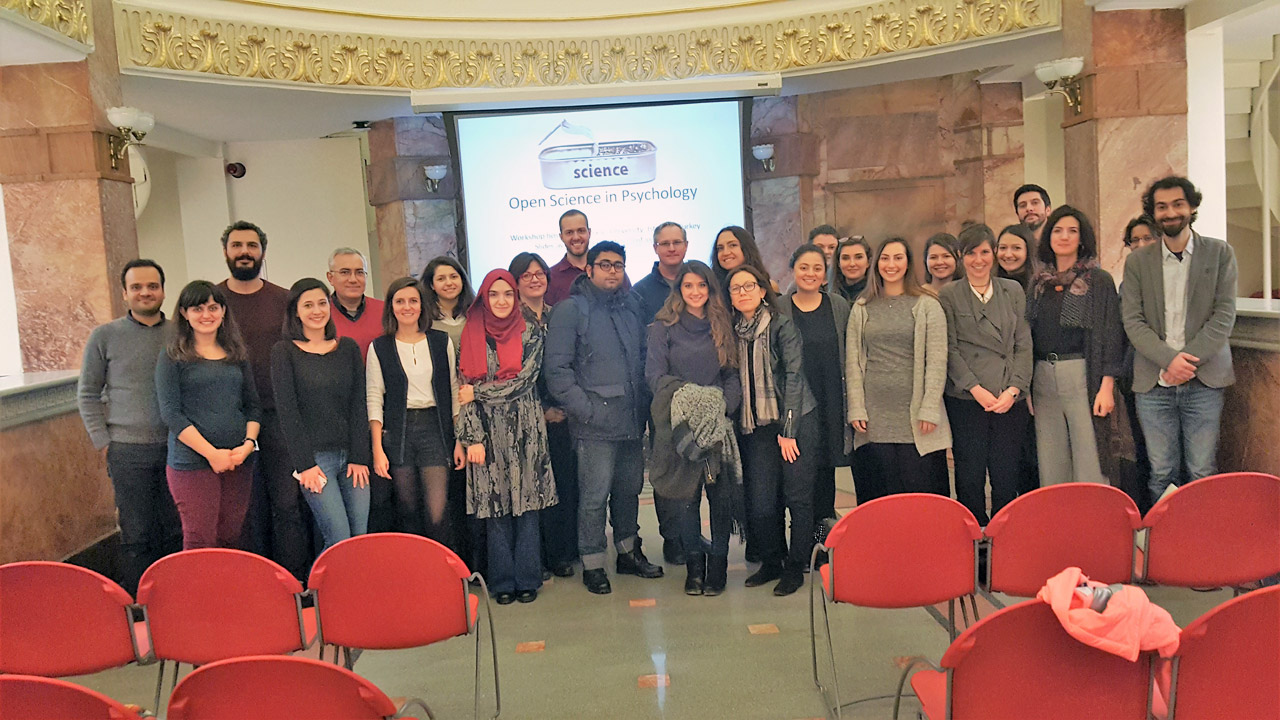RKTS Grant Report by Asuman Buyukcan-Tetik
24.07.2017, by Sibylle Classen in grant report
Sabanci University, Istanbul, Turkey; Workshops "Reproducible and Open Science: Theory and Practice" and "Research Methods and Cultural Context in Psychology: The Case of Relationship Research", January 19-20, 2017
 in total, 3 pictures
in total, 3 pictures
Thanks to the Research Knowledge Transfer Scheme (RKTS) of the European Association of Social Psychology, I was able to host Prof. Lorne Campbell (University of Western Ontario, Canada) at Sabanci University, Istanbul, Turkey, between January 9th and January 30th, 2017. During his visit, Prof. Campbell and I organized two workshops ("Reproducible and Open Science: Theory and Practice" and "Research Methods and Cultural Context in Psychology: The Case of Relationship Research"), worked on some collaborative projects, and had one-to-one research meetings with some researchers from other Turkish universities.
Our first workshop on Reproducible and Open Science took place on January 19th, 2017. Prof. Campbell is an active researcher at the forefront of the open science movement and replication attempts, research activities that are growing in importance and popularity in recent years across disciplines. For example, he has given lectures (e.g., Campbell, 2015, 2016) and published some articles on this topic (Campbell, Loving, & LeBel, 2014; LeBel, Loving, & Campbell, in press; Stanton & Campbell, 2016). In our first workshop on open science, Prof. Campbell generously shared his knowledge and experience on this topic with the participants. Participants also had the opportunity to have hands-on experience with their own laptops during the workshop, because Prof. Campbell taught how to use the Open Science Framework (OSF; https://osf.io/) to create a new project.
In our second workshop on January 20th, in addition to Prof. Campbell, we had another influential and well-known researcher, Prof. Nebi Sümer from Middle East Technical University, Turkey, as a speaker. In that workshop, Prof. Campbell gave a talk about the Research Methods for Relationship Research. That is, he shared his experience in using multi-method approach to collect data, told the problems he encountered, and discussed possible solutions. The title of Prof. Sümer's talk was "Predictive Power of Attachment Anxiety and Avoidance in Different Cultural Contexts." In his talk, Prof. Sumer first reviewed the cultural aspects of attachment, and then presented an interesting series of cross-cultural studies from his lab.
In total, we had 59 participants in two workshops. Our participants were affiliated with 11 different universities in Turkey (e.g., Sabanci University, Bilkent University, Koc University, Middle East Technical University, Ozyegin University). Sixty one percent of the participants were students (i.e., undergraduates, master students, and PhD students). During the workshops, the participants had the opportunity to discuss their ideas and opinions about open science, research methods, and cultural context in psychology with each other and with the workshop speakers.
In addition to these workshops, as an output of our collaboration with Prof. Campbell during his visit, we have submitted a manuscript on how much of a discrepancy between ideal partner standards and perceptions of current romantic partner's attributes is acceptable with respect to relationship satisfaction. We also discussed and planned further steps of our research together. Prof. Campbell's meetings with researchers from other universities in Turkey also provided the opportunity to discuss some ideas and exchange information and experiences for all parties.
Our events could not have been possible without the RKTS. I deeply appreciate the European Association of Social Psychology's generous support to our workshops and collaborations. Additionally, I would like to thank Prof. Lorne Campbell and Prof. Nebi Sümer for sharing their extensive knowledge and expertise with the Turkish researchers who participated in our workshops and/or had meetings with them.
References
- Campbell, L. (2015). Doing open science. Invited three-hour workshop on open science practices at the University of Toronto, Mississauga, CA.
- Campbell, L. (2016). Doing open science: You have choices. Invited talk presented at the “Navigating the New Era of Social & Personality Psychology” pre-conference of the annual conference of the Society of Personality and Social Psychology, San Diego, CA, USA.
- Campbell, L., Loving, T. J., & LeBel, E. P. (2014). Enhancing transparency of the research process to increase accuracy of findings: A guide for relationship researchers. Personal Relationships, 21, 531-545.
- LeBel, E.P., Loving, T.J., & Campbell, L. (in press). Benefits of open and high-powered research outweigh costs. Journal of Personality and Social Psychology.
- Stanton, S.C.E., & Campbell, L. (2016). Attachment avoidance and amends-making: A case advocating the need for attempting to replicate one’s own work. Journal of Experimental Social Psychology, 67, 43-49.